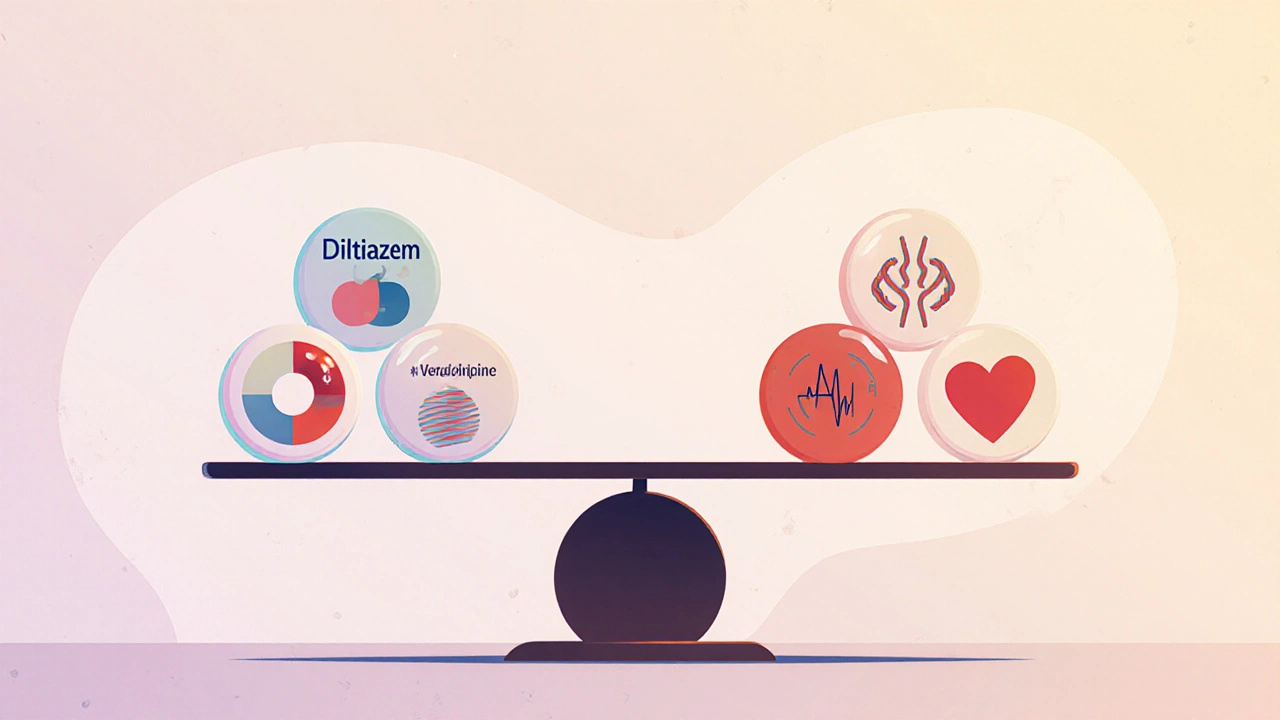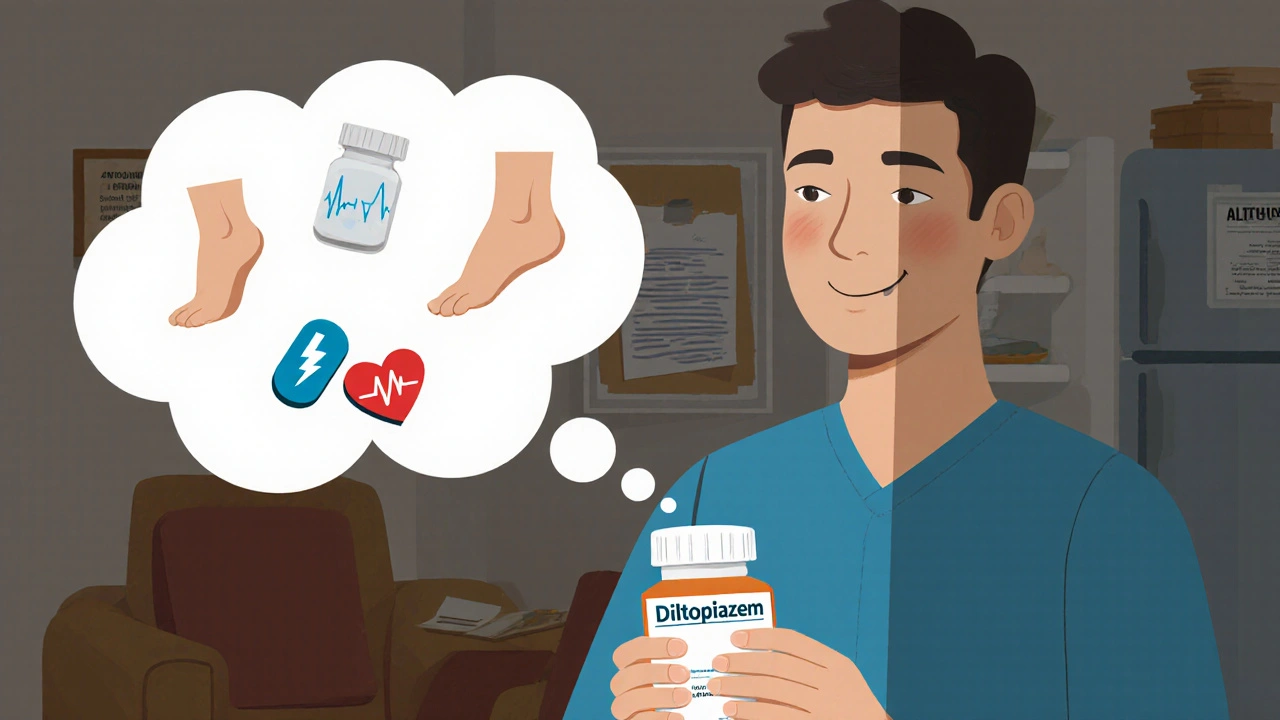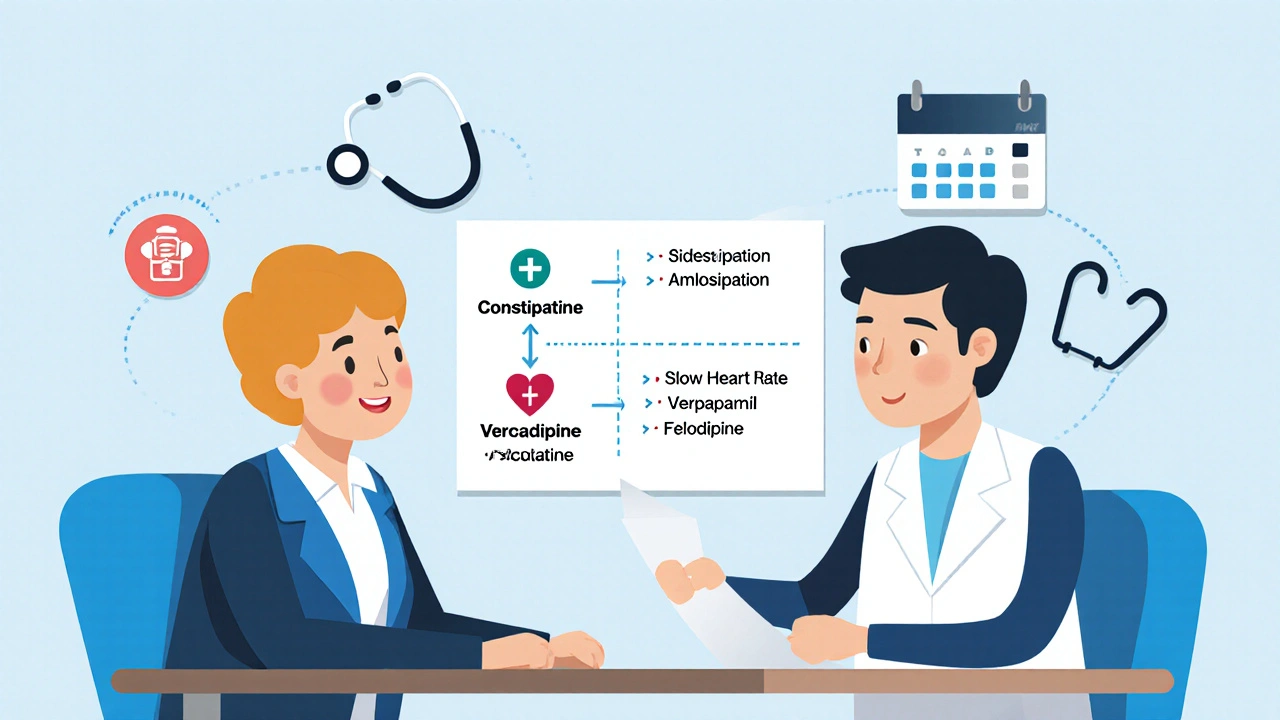Compare Diltiazem HCL with Other Calcium Channel Blockers: Alternatives for High Blood Pressure and Angina

Calcium Channel Blocker Comparison Tool
Find Your Best Calcium Channel Blocker Alternative
Answer a few questions about your condition and concerns to get personalized recommendations for alternatives to Diltiazem HCL.
When your doctor prescribes Diltiazem HCL for high blood pressure or angina, it’s not the only option. Many people wonder if there’s something better, cheaper, or with fewer side effects. The truth is, several other medications work similarly - but they’re not all the same. Choosing the right one depends on your heart condition, other health issues, and how your body reacts. This isn’t about swapping pills blindly. It’s about understanding what each drug does, how it compares, and who it works best for.
What Diltiazem HCL Actually Does
Diltiazem HCL is a calcium channel blocker used to treat high blood pressure, angina (chest pain), and certain heart rhythm disorders. Also known as Diltiazem, it works by relaxing blood vessels and slowing down the heart’s electrical signals. This reduces the heart’s workload and lowers blood pressure. It comes in immediate-release tablets, extended-release capsules, and even injectable forms for hospital use.
Most people take it once or twice a day. The extended-release versions, like Cardizem CD or Tiazac, let you take just one pill daily. That’s convenient - but not everyone tolerates it well. Common side effects include dizziness, swelling in the ankles, constipation, and fatigue. For some, these side effects are mild. For others, they’re enough to make them look for alternatives.
Why People Look for Alternatives
People switch from Diltiazem for several real reasons:
- They get too much swelling in their legs or feet
- Constipation becomes a daily struggle
- They feel overly tired or lightheaded
- They’re on other meds that interact badly with Diltiazem
- The cost is too high, especially without insurance
One 2023 study in the Journal of Clinical Hypertension found that nearly 18% of patients on Diltiazem switched to another calcium channel blocker within the first year - mostly because of side effects, not lack of effectiveness. That’s a lot of people looking for something else.
Top Alternatives to Diltiazem HCL
There are four main calcium channel blockers used as direct alternatives to Diltiazem. Each has its own strengths and weaknesses.
| Medication | Brand Names | Primary Use | Dosing Frequency | Common Side Effects | Key Differences from Diltiazem |
|---|---|---|---|---|---|
| Amlodipine | Amlodipine, Norvasc | High blood pressure, angina | Once daily | Swelling in legs, flushing, dizziness | More focused on blood vessels; less effect on heart rate |
| Verapamil | Calan, Verelan, Isoptin | High blood pressure, angina, arrhythmias | One to three times daily | Constipation, dizziness, slow heart rate | Stronger effect on heart rhythm; higher risk of bradycardia |
| Nifedipine | Procardia, Adalat | High blood pressure, angina | Once or twice daily (extended-release) | Headache, flushing, rapid heartbeat | Fast-acting; can cause sudden drops in blood pressure |
| Felodipine | Plendil | High blood pressure | Once daily | Swelling, headache, dizziness | Milder effect on heart rate; often used when heart rate needs to stay normal |
Let’s break down what this means for real people.
Amlodipine: The Most Common Swap
Amlodipine is the most frequently prescribed alternative to Diltiazem. Why? Because it’s simple. Once a day. Fewer digestive side effects. It doesn’t slow your heart rate as much - which is good if you already have a slow pulse.
But here’s the catch: Amlodipine causes more ankle swelling than Diltiazem. If you’re on your feet all day or live in a hot climate, that swelling can be annoying. Still, for most people, it’s easier to manage than constipation. A 2024 analysis in Cardiovascular Therapeutics showed that patients switching from Diltiazem to Amlodipine reported 30% less constipation and 25% fewer cases of fatigue.

Verapamil: The Heart Rate Specialist
If your main problem is an irregular heartbeat - like atrial fibrillation - Verapamil might be a better fit than Diltiazem. It’s stronger at controlling heart rhythm. But that strength comes with risks.
Verapamil can slow your heart rate too much, especially if you’re older or already taking beta-blockers. It also causes constipation even more often than Diltiazem. If you’ve had bowel issues before, this might not be the move.
Doctors often choose Verapamil when Diltiazem didn’t control the heart rhythm well enough. But if your issue is mostly high blood pressure, not arrhythmia, Verapamil isn’t usually the first pick.
Nifedipine: Fast but Risky
Nifedipine works fast - really fast. That’s why it’s sometimes used in emergencies to lower blood pressure quickly. But for daily use? It’s trickier.
The immediate-release form can cause sudden drops in blood pressure, leading to dizziness or fainting. That’s why most doctors now prescribe only the extended-release version (Procardia XL). Even then, some people get bad headaches or a pounding heartbeat.
It’s not a top choice for long-term use unless other options have failed. But for someone who needs a quick effect and can handle the side effects, it works.
Felodipine: The Gentle Option
Felodipine is less commonly prescribed, but it’s worth knowing about. It’s a calcium channel blocker that mostly targets blood vessels, not the heart. That means it lowers blood pressure without slowing your heart rate.
It’s often used in older adults or people with COPD or asthma who can’t take beta-blockers. Side effects are mild - mostly swelling and headaches. But it’s more expensive than Amlodipine, and not always covered by insurance.
Other Non-Calcium Channel Options
Not everyone needs another calcium channel blocker. Sometimes, switching to a completely different class of drug makes more sense.
- ACE inhibitors like Lisinopril - good for people with diabetes or kidney disease
- ARBs like Losartan - similar to ACE inhibitors but fewer cough side effects
- Thiazide diuretics like Hydrochlorothiazide - cheap, effective, great for older adults
- Beta-blockers like Metoprolol - helpful if you’ve had a heart attack or have fast heart rhythms
These aren’t direct replacements for Diltiazem. They work differently. But if you’re struggling with side effects or need to treat another condition (like heart failure or kidney disease), they might be a better overall fit.

When to Stick With Diltiazem
Just because there are alternatives doesn’t mean you should switch. Diltiazem works well for many people. If you’re not having side effects, your blood pressure is under control, and you’re not on conflicting meds - there’s no reason to change.
It’s especially useful if you have both high blood pressure and a fast or irregular heartbeat. Diltiazem hits both targets. Amlodipine lowers pressure but doesn’t help much with rhythm. Verapamil helps rhythm but can slow your heart too much.
Doctors often keep patients on Diltiazem if they’re doing well - because stability matters more than a slight edge in side effects.
What to Ask Your Doctor
If you’re thinking about switching, don’t just ask, “What else can I take?” Ask these questions instead:
- Is my current problem mainly high blood pressure, angina, or an irregular heartbeat?
- Which side effects am I struggling with most - swelling, constipation, fatigue, or dizziness?
- Am I taking any other medications that might interact with these drugs?
- What’s the cost difference? Is there a generic version available?
- Will this new drug help with any other health issues I have?
Bring your pill bottles to the appointment. Show your doctor exactly what you’re taking and how you’re feeling. That’s the fastest way to get a personalized answer.
Real-World Experience: A Patient Story
Maria, 68, from Tacoma, started on Diltiazem for high blood pressure. After three months, she couldn’t go a day without constipation. She tried laxatives, more fiber, water - nothing helped. Her doctor switched her to Amlodipine. Within a week, her bowels returned to normal. Her blood pressure stayed the same. The only new issue? Mild swelling in her ankles. She started wearing compression socks and walking daily. The swelling faded over two weeks.
She didn’t need a miracle drug. She needed the right fit. And that’s what this is all about.
Final Thoughts: No One-Size-Fits-All
Diltiazem HCL isn’t better or worse than its alternatives - it’s just different. What works for your neighbor might not work for you. The goal isn’t to find the "best" drug. It’s to find the one that controls your condition with the fewest side effects and the least disruption to your life.
Switching meds isn’t a failure. It’s part of managing your health. But never do it on your own. Always talk to your doctor first. Blood pressure meds aren’t like painkillers. Getting the dose or type wrong can be dangerous.
If you’re unhappy with Diltiazem, you have options. But the right one depends on your body, your habits, and your other health needs. Take the time to figure it out.
Is Diltiazem HCL the same as Diltiazem?
Yes. Diltiazem HCL is the hydrochloride salt form of Diltiazem. It’s the same active ingredient. The "HCL" just tells you the chemical form used to make the pill stable and absorbable. You’ll see both names used interchangeably in prescriptions and medical records.
Can I switch from Diltiazem to Amlodipine on my own?
No. Never stop or switch blood pressure medications without your doctor’s guidance. Abruptly stopping Diltiazem can cause rebound high blood pressure or chest pain. Switching requires a careful plan - often starting the new drug while slowly reducing the old one. Your doctor will monitor your blood pressure and heart rate during the transition.
Which alternative is cheapest?
Amlodipine is usually the cheapest. Generic versions cost as little as $4-$10 per month at most U.S. pharmacies. Diltiazem generics are also affordable, but Amlodipine is often the lowest-cost option with the broadest insurance coverage. Verapamil and Felodipine tend to be more expensive.
Do these drugs cause weight gain?
Calcium channel blockers like Diltiazem, Amlodipine, and Verapamil don’t directly cause weight gain. But they can cause fluid retention - especially in the ankles and feet. This makes you feel heavier or look puffy. It’s not fat gain, but it can be mistaken for it. Diuretics like Hydrochlorothiazide actually help reduce this swelling.
Can I take grapefruit juice with Diltiazem or its alternatives?
Avoid grapefruit juice with Diltiazem, Verapamil, and Nifedipine. Grapefruit interferes with how your body breaks down these drugs, leading to higher levels in your blood. That increases the risk of side effects like low blood pressure or slow heart rate. Amlodipine and Felodipine are less affected, but it’s still safer to avoid grapefruit altogether unless your doctor says otherwise.
What if none of these alternatives work for me?
If calcium channel blockers aren’t working or cause too many side effects, your doctor may try other classes: ACE inhibitors, ARBs, beta-blockers, or diuretics. Sometimes, combining two lower-dose drugs works better than one high-dose drug. In rare cases, newer medications like Cinacalcet or Entresto may be considered - but only for specific conditions like heart failure. Your doctor will tailor the next step based on your full health picture.

Ashley Miller
November 20, 2025 AT 02:04Of course the pharma giants want you to think it's all about 'side effects'... they're just testing which flavor of poison you'll swallow quietly. Diltiazem? Amlodipine? Same active ingredient in different colored pills. They're all just cash cows with a side of constipation. The real cure? Stop eating processed food and get off your couch. But hey, keep taking the pills, right? 😘
Sherri Naslund
November 21, 2025 AT 20:22ok so like i read this whole thing and i just wanna say... why are we even talking about pills? like we all know the system is rigged. they dont want you healthy they want you dependent. also why is everyone always talking about swelling? my cousin took amlodipine and started levitating. no joke. she said her feet felt like balloons. then she disappeared for 3 days. came back saying the government installed tracking chips in the pills. i believe her. also i think diltiazem is just a cover for mind control. ask your doctor if your blood pressure meds are secretly listening to you.
Martin Rodrigue
November 22, 2025 AT 10:57While the comparative pharmacology presented is generally accurate, it lacks a critical discussion of the CYP3A4 metabolic pathway implications across these agents. Diltiazem and verapamil are both moderate inhibitors of CYP3A4, whereas amlodipine is not. This has profound implications for polypharmacy, particularly in elderly patients on statins, immunosuppressants, or certain antifungals. The omission of drug-drug interaction profiles renders this analysis clinically incomplete. Furthermore, the assertion that felodipine is 'gentler' is misleading-it has a higher bioavailability variability and is significantly affected by food intake, which compromises therapeutic consistency. A more rigorous approach would include pharmacokinetic half-lives and protein binding differences.
Arun Mohan
November 23, 2025 AT 05:01Look, I’ve studied pharmacology at Harvard and let me tell you-this whole post is basic. Amlodipine? Pathetic. You think swelling’s bad? Try being on verapamil in a humid climate with a history of AV block. I’ve seen patients turn into slow-motion zombies. And don’t even get me started on how everyone just copies the guidelines like they’re scripture. Real medicine isn’t in a table. It’s in the silence between the patient’s breaths. Also, I’m pretty sure the FDA is owned by Big Pharma. Just saying.
Tyrone Luton
November 23, 2025 AT 05:44There’s a deeper truth here. We treat hypertension like a math problem-dose this, subtract that. But the body isn’t a spreadsheet. It’s a living rhythm. Diltiazem doesn’t just block calcium-it asks the heart to slow down, to breathe. Maybe the real question isn’t which drug is better… but which life are we trying to preserve? The one that’s medicated and stable… or the one that’s wild, messy, and truly alive? I’ve seen people switch to amlodipine and lose their anxiety… but also lose their spark. What’s the cost of control?
Jeff Moeller
November 23, 2025 AT 17:59Herbert Scheffknecht
November 23, 2025 AT 22:23You know what’s wild? Nobody ever talks about how these drugs are just Band-Aids on a system that’s collapsing. We’re told to take a pill for high blood pressure… but we’re told to work 60-hour weeks, eat processed food, sleep 4 hours, and drink coffee like it’s water. We’re medicating the symptoms of a culture that’s sick. Diltiazem? Amlodipine? They’re just the price we pay for living in a world that doesn’t care if you live or die-just as long as you show up. I’m not saying stop the meds. I’m saying ask why we need them in the first place.
Jessica Engelhardt
November 25, 2025 AT 20:39Ugh I’m so tired of this American healthcare nonsense. In India they just give you a tablet and say ‘take it’ and you live. Here we got 17 different versions of the same pill and everyone’s scared to death of side effects. I had my aunt on felodipine for 10 years and she’s still hiking in the Rockies. You think swelling’s bad? Try living in a country where your doctor doesn’t even speak English. You learn to just take the damn pill and not question it. We’re so soft. Also grapefruit juice? Please. That’s just a way for doctors to feel smart. I drink it with everything. Still alive.
Lauren Hale
November 26, 2025 AT 17:19Thank you for writing this so clearly. I’ve been on diltiazem for 5 years and honestly, the constipation was killing me. I switched to amlodipine and the difference was night and day-no more laxatives, no more dread before breakfast. The ankle swelling? Yeah, it happened. But I started walking 30 minutes a day and wearing compression socks. It faded. No magic. Just small changes. I wish I’d known this info sooner. To anyone reading this: your doctor isn’t a mind reader. Bring your pill bottles. Write down your symptoms. Ask the five questions listed. You deserve to feel like yourself again-not just ‘stable’.
Greg Knight
November 28, 2025 AT 09:53I want to tell you something real. I’ve been a nurse for 22 years. I’ve seen people switch meds because they were scared. I’ve seen people stay on the wrong drug because they were too tired to fight. But I’ve also seen the moment someone finally finds the right one-when they laugh again at breakfast, when they can play with their grandkids without stopping to catch their breath. Diltiazem isn’t the villain. Neither is amlodipine. The villain is silence. The villain is thinking you have to suffer in silence. You don’t. Ask questions. Bring your list. Show your pain. Your body is talking. Listen. And if you’re scared? Find someone who’ll hold your hand through the switch. You’re not alone in this.
rachna jafri
November 30, 2025 AT 03:27So you’re telling me the whole system is designed to keep us docile? Diltiazem? Amlodipine? All the same corporate puppet show. They don’t want you healthy-they want you compliant. Did you know the FDA gets funding from Big Pharma? And that the clinical trials for these drugs are funded by the same companies that make them? That’s why they only test for ‘efficacy’ and not long-term soul erosion. They don’t care if you’re constipated-they care if your blood pressure reads 120/80. I’ve seen people on these drugs lose their memory, their joy, their connection to the earth. The real alternative? Quit the system. Grow your own food. Walk barefoot. Meditate. The pills are just the leash. Break it before it breaks you.